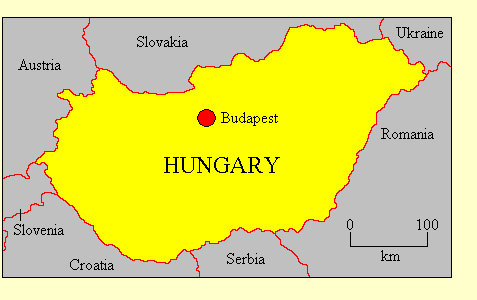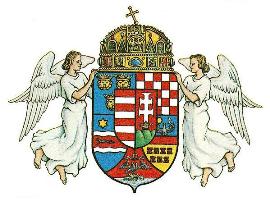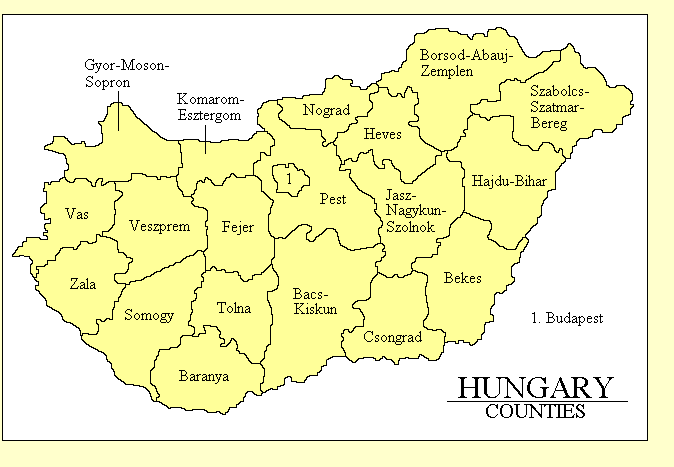

REPUBLIC OF HUNGARY
• Official name: Magyar Koztarsasag (Republic of Hungary)
• Location: Central Europe
• International organisations: Council of Europe, European Union, North Atlantic Treaty
Organisation, Organisation for Economic Co-operation and Development, Organisation for
Security and Co-operation in Europe, United Nations, World Trade Organisation
• Borders: Austria, Croatia, Romania, Serbia, Slovakia, Slovenia, Ukraine
• Coastline: None
• Land area: 93,030 Km2
• Population: 10,000,000
• Annual GDP (PPP) per capita: US$18,600 (2009 CIA estimate). World ranking: 49
• Ethnicity: Hungarian 89.9%, Roma 4%, German 2.6%, Serb 2%
• Languages: Hungarian (the official language) 98.2%
• Religion: The great majority are at least nominal Christians (Catholic 65%, Protestant 25%).
• Form of government: Parliamentary democratic republic. Hungary is divided into 19 counties
and 20 urban counties.
• Capital: Budapest
• Constitution: The Constitution of the Republic of Hungary came into effect on 18 August 1949, but
was radically revised in 1989.

• Head of state: The President, elected by the legislature for a five-year term. The
President's functions are largely ceremonial. President
Pal Schmitt
was elected on 6 August 2010.
• Head of government: The Prime Minister, appointed by the President. The Prime Minister is the leader of the largest party in the legislature and is accountable to it.
• Legislature: Hungary has a unicameral legislature. The
National Assembly (Orszaggyules) has 386 members,
elected for four-year terms. Of these, 176 members are elected from single-seat constituencies,
152 by proportional representation from multi-seat constituencies and 58
from national lists to achieve proportional representation.
• Electoral authority: The Hungarian Ministry of the Interior Central Registration and Election Office
administers national elections.
• Freedom House 2011 rating: Political Rights 1, Civil Liberties 1
• Transparency International Corruption Index: 47% (50 of 178 countries rated)
• Reporters Without Borders Press Freedom 2010 Index: 92.5% (23 of 178 countries rated)
• Heritage Foundation Economic Freedom 2010 Index: 66.6% (51 of 179 countries rated)
Political history
The mediaeval Kingdom of Hungary was destroyed by the Ottomans at the Battle of Mohacs
in 1526, and those Hungarian territories not held by the Ottomans came under the rule of the
Austrian Habsburgs. The Habsburgs gradually reconquered Hungary and ruled the whole country
by 1700. Hungarian nationalism reasserted itself in the 19th century with a national rising
in 1848, but the Habsburgs regained control with Russian assistance. In 1867 the Habsburgs
agreed to share power with the Hungarian nobility in what became known as the Austro-Hungarian
Empire.

When the Habsburg Empire collapsed in 1918, Hungary underwent first a democratic
revolution, then a Communist
seizure of power, then a Romanian invasion, as well as several attempts by the exiled
Habsburg Emperor Karl to reclaim the Hungarian throne. In 1920 Admiral Miklos Horthy de Nagybanya, former
commander of the Imperial Navy, was declared Regent. Horthy allied Hungary with the Germans in World War II,
which led to Soviet invasion and the imposition of a Communist regime.
The Communist regime was extremely unpopular, and in 1956 the "thaw" in the Soviet
Union encouraged a revolt, leading to a Soviet invasion which crushed the revolt. In the 1970s
the Communists allowed a gradual liberalisation, and when in 1989 the Soviets made it clear
they would not intervene again, they gave up power voluntarily and free elections were held. Hungary joined
NATO in 1999 and the EU in 2003.
As elsewhere in East/Central Europe, the former Communists successfully
repackaged themselves for democratic politics. The
Hungarian Socialist Party (MSP) is a moderate, pre-Europe and pro-Western
party. The main conservative party is the Hungarian Citizens' Party, known as
Fidesz, which is in coalition with the
Hungarian Democratic Forum. Other significant parties are the
liberal Alliance of Free Democrats (SDS) and the extreme right
The Movement for a Better Hungary, known as Jobbik.
The MSP was in government from 2002 to 2010, until 2008 in coalition with the SDS and
then alone as a minority government. After a series of scandals and in deteriorating economic
conditions, elections in April 2010 saw a massive victory for Fidesz, and its leader,
Viktor Orban, became Prime Minister for the
second time.
Updated November 2011
|


